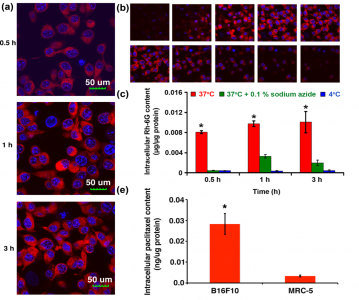
Metastatic cancers and multi-drug resistant cancers are causes of high mortality globally. In developing countries like India, lung cancer, breast cancer, cervical cancer and oral cancers have high prevalence rates. Present chemotherapy is non-specific and suffers from many systemic side effects like bone marrow suppression.
The technology developed consists of platforms which are stimuli responsive smart materials that respond to changes in pH, and enzyme levels for site specific drug delivery in cancers. For example, core-shell nanoparticles responsive to pH and matrix metalloproteinases have been designed for sequential delivery of combinations of anticancer drugs for oral delivery. These nanocapsules show increased efficacy in drug resistant breast cancers and reduce the cardiotoxicity and bone marrow suppression seen with conventional drugs. The trigger responsive behavior of the nanoparticles allows specificity without the need for antibody mediated targeting. Pulmonary surfactant mimetic nanoparticles have been developed that are pH responsive and act as platforms for aerosol therapy in lung cancers and pulmonary metastasis. They undergo a lamellar to inverted hexagonal phase transition in presence of tumor pH.
This technology has been recognised as one of the most innovative healthcare technologies by MIT Technology Review, USA and has been showcased as a promising Indian invention in the magazine ‘The Economist’ in 2012 and has also been the recipient of the Lockheed Martin Innovation Award 2015. These technologies have led to one granted Indian patent and three other filed patents. The technology platforms are versatile and can be suitable for different types of small molecule and biopharmaceutical drugs through intravenous, aerosol and oral routes. The technology has been validated in animal models and is ready for scale up, preclinical toxicology and clinical trials.
(Late) Prof. Rinti Banerjee
